As a thyroid patient you probably already know that making and keeping healthy habits can have a noticeable improvement on your thyroid.
I don’t need to convince you that eating healthy whole foods, getting enough rest, or taking the right supplements can help improve your thyroid.
In fact, there’s a lot of evidence and patient stories to support the idea that certain healthy habits can bring Hashimoto’s into remission and even reduce how much thyroid medication you need to take each day.
I’m not here to dispute any of these things.
But what I am here to do is talk about some healthy habits that you might be doing that are actually harmful to your thyroid gland.
Because the thyroid gland is so unique, healthy habits that may work to keep your body healthy may actually cause problems for your thyroid.
Even simple things like what type of salt you eat or how you prepare your vegetables or what form of vitamin B12 you take can negatively impact your thyroid.
So if you are someone trying to live a healthier lifestyle, if you are someone who has adopted certain healthy habits from other blog posts or videos but not feeling well, then you may want to double-check those healthy habits to see if they are actually healthy!
Before we talk about these habits I want to make something very clear:
This information isn’t meant to confuse you or second guess all of your healthy eating or healthy habits, but you should be aware that some of the things you are doing may not be so healthy after all.
This is especially important if you are someone who is actively trying to live a healthy lifestyle but you still aren’t where you think you should be.
#1. Using Himalayan Pink Salt and Celtic Sea Salt
It is absolutely NOT the case that Himalayan pink salt and Celtic sea salt are bad for you or your thyroid.
In fact, there’s an argument to be made that these forms of salt are actually healthier for you compared to the average table salt.
Himalayan pink salt is particularly beneficial because it contains different minerals that are often ideal for those with thyroid problems.
And it is this logic that leads thyroid patients to use these salts over traditional forms of salt.
They think: “If Himalayan pink salt is healthier than regular salt then why shouldn’t I use it to get these beneficial minerals into my body?”.
And you are right if you are thinking this!
The problem with this is not in the Himalayan pink salt but in what you replace it with.
And, for most people, that means iodized salt (1).
The average person who switches to Himalayan pink salt or Celtic sea salt is doing it for health reasons but what they may not realize is by doing so they are missing out on one of the primary sources of iodine intake from their diet.
Why does this matter?
Because iodine is one of the top 3 most important nutrients for thyroid function and many people are intentionally or unintentionally reducing their intake of iodine each day.
Without enough iodine, you won’t be able to produce thyroid hormone which may lead to worsening hypothyroid symptoms and thyroid function.
So if you are someone who is consuming these types of salt but you are also getting your daily dose of iodine from other food sources such as sea vegetables, fish, or other sources, then you don’t have anything to worry about!
But if you are like most people, you aren’t getting enough iodine from your diet (2) so when you make the switch over to Himalayan pink salt or Celtic sea salt you’ve just got rid of your #1 source of dietary iodine.
The bottom line?
It’s not the salts that are the problem, it’s what you may no longer be consuming that can be.
If you want to use these types of salt (and I would encourage you to do so), just make sure you are still getting your iodine from some other sources.
You can either get your iodine from food sources or from supplements. It doesn’t matter where you get it from, just make sure that you do.
#2. Eating Too Many Green Vegetables (Without Complementary Iodine Intake)
The reason that you hear people talk about vegetables all of the time in relation to your thyroid is that they contain something called goitrogens.
Goitrogens act to block the uptake of iodine into your gland.
Put another way, these goitrogens prevent you from creating thyroid hormones and may cause a low thyroid state.
And green vegetables are a big source of goitrogens.
This logic has led many thyroid patients to automatically assume that green vegetables are somehow dangerous and should be avoided.
But this is completely false for most people.
Why?
Because the goitrogenic effect of green vegetables is minimal and if you consume enough iodine that iodine will outcompete the goitrogens and you will still create thyroid hormone.

But let’s assume two important things:
#1. Let’s imagine that you are someone who is no longer using iodized salt because you have switched to Himalayan pink salt or Celtic sea salt.
And #2. Let’s imagine that you are someone who is simultaneously trying to eat healthier so you increase your daily consumption of green vegetables.
Do you see the problem here?
You’ve simultaneously DECREASED iodine consumption while increasing GOITROGEN intake with these two healthy habits.
It’s not one or the other that is particularly harmful but when added together they create a scenario in which your thyroid may not be able to get enough iodine.
So what’s the solution?
Well, it’s easy actually, you just need to consume more iodine!
If you get your iodine intake into the healthy range then it doesn’t really matter that you are consuming more green vegetables (which is a good thing, by the way).
But if you wanted to take it a step further to ensure that your veggies don’t cause any thyroid problems then you can simply steam them before you eat them.
Preparing your veggies with steam will reduce the concentration of goitrogenic compounds and ensure that they won’t cause any issues.
The bottom line here is that you should be consuming enough iodine each and every day so even if there is some goitrogenic effect from the foods that you eat it won’t be sufficient to cause any problems.
For most people, iodine intake in the range of at least 150 to 250mcg each day is sufficient.
#3. Taking a Hair, Skin, and Nails Supplement
Let me be clear:
Hair, skin, and nail supplements are NOT harmful to the thyroid but they do contain an ingredient that can cause a lot of confusion for thyroid patients.
And that ingredient is biotin.
Let me explain:
Biotin is a B vitamin (3) frequently found in hair, skin, and nail supplements (including my own thyroid hair regrowth complex) because it’s a necessary ingredient for hair growth (4)!
It makes sense that these supplements contain this ingredient.
But what you need to know is that biotin can interfere with thyroid lab testing assays.
Some thyroid patients get the biotin-thyroid thing confused, though, so make sure you don’t misunderstand me.
Biotin doesn’t impact your thyroid but it can interfere with thyroid lab tests.
If you have biotin floating around in your system when you get your labs drawn it can bind to the thyroid testing assay which makes it look like you have more thyroid floating around in your body than you really do.
Biotin can make it look like you are hyperthyroid when you are really hypothyroid.
This is a big problem because it may cause your doctor to incorrectly lower your dose of thyroid medication to try and compensate.
But they are chasing a ghost. It’s not actually your thyroid that’s the problem, it’s the biotin.
Some thyroid patients, and even doctors, take this to mean that biotin should 100% be avoided.
But complete avoidance is not necessary!
You can solve this biotin-thyroid debacle by simply avoiding biotin 2 days before you get your labs drawn.
If you want to be on the extra-safe side you can stop taking your biotin 3-4 days before you are scheduled to get your labs drawn.
By that time, the biotin will be out of your system and will not interfere with your lab tests.
#4. Eating Too Many Brazil Nuts Each Day
This one was inspired by a recent trip to Costco in which I noticed that there was an entire bag of organic Brazil nuts marketed as a keto snack.
It turns out that while brazil nuts can be used as a decent keto snack, they are also a HUGE source of selenium.
It’s been said that the average brazil nut contains around 90mcg (5) of selenium.
While that’s not necessarily true (the dosing of selenium varies by Brazil nut), it is definitely true that brazil nuts contain a lot more selenium than most other foods.
Which makes it a desirable superfood for thyroid patients.
After all, selenium plays a very important role in thyroid gland inflammation, T4 to T3 conversion, and glutathione production (6).
For this reason, many thyroid patients are all too eager to eat 1-2 brazil nuts every day.
So why is this included on the list?
Because selenium toxicity is a real thing that you should be aware of.
And one of the easiest ways to become toxic on selenium is with the judicious consumption of brazil nuts!
If the average brazil nut contains 90mcg of selenium and the ideal dose of selenium for thyroid patients is around 100 to 200mcg each day, you can see how quickly you can get over that dose with just a handful of Brazil nuts.
Now imagine you are someone who eats 10 or 20 Brazil nuts in one day.
You could be getting 900mcg to 1,800mg of selenium in one sitting!
Selenium toxicity symptoms mimic those of low thyroid function including:
- Hair loss
- Fatigue
- Nail changes
- Gastrointestinal problems
- Nausea
- Joint pain
It’s not that Brazil nuts are necessarily harmful by themselves, in fact, the opposite is true.
There’s a good case to make for thyroid patients consuming 1-2 Brazil nuts on a daily basis.
But if you don’t understand how potent these nuts are and you accidentally start consuming a high quantity of them, you do run the risk of causing problems.
The good news is that treating selenium toxicity is fairly easy, you just need to stop consuming the selenium and your body will take care of the rest!
#5. Taking Supplements that Contain Sulforaphane
If you aren’t familiar with sulforaphane, let me explain:
Sulforaphane is an ingredient found in cruciferous vegetables, the same vegetables that are often touted as some of the healthiest and most nutritious foods on the planet.
Sulforaphane is the ingredient that makes these vegetables so healthy.
It has been shown to fight cancer, reduce inflammation, and act as an antioxidant (7).
The science is pretty clear that sulforaphane is a superfood with very beneficial effects on the body.
And a lot of people know this which is why sulforaphane supplements have been created.
The logic goes that even if you can’t consume vegetables each and every day then maybe you can still get some benefit by taking supplements that contain sulforaphane.
And while this logic makes sense, you have to think about it in context with your thyroid.
Remember when we talked about green vegetables in #2 above?
Sulforaphane has a goitrogenic effect (8)!
Again, it’s not a problem if you are taking supplements with this ingredient but you better be aware that it will cause some competition with iodine and may result in decreased iodine uptake into your thyroid gland.
What’s the solution?
If you are taking a sulforaphane supplement all you need to do is adjust your iodine intake to compensate for the supplement.
#6. Consuming Foods and Supplements that Contain Cyanide
Most people know that cyanide is harmful to the human body, at least in large doses.
What you may not realize, though, is that cyanide naturally occurs in foods and even some supplements.
Normally, this really isn’t an issue, though, because your body has sophisticated ways to eliminate it.
And it is on these pathways that we need to focus.
When your body eliminates cyanide it can turn it into something called thiocyanate which is a breakdown product of cyanide.
Your body turns cyanide into these thiocyanates in the liver and kidneys so it can eliminate them.
What you need to know is thiocyanate has the potential to block iodine function in the thyroid gland similar to goitrogens.
The body is well equipped to handle cyanide metabolism but by doing so it may draw away resources that your thyroid needs to produce thyroid hormone which is also a problem.
Either because the cyanide is blocking iodine uptake or because it is taking resources away from thyroid hormone production, you really don’t want a lot of cyanide floating around in your body if you are a thyroid patient.
Cyanide probably isn’t a big issue for most people, but it can be for thyroid patients, and here’s why:
Many of the treatments and therapies that thyroid patients utilize may introduce naturally occurring sources of cyanide into their bodies which have the potential to cause issues.
As an example, here are a few naturally occurring sources of cyanide that you should be aware of:
- Cyanocobalamin – Cyanocobalamin is a cheap form of vitamin B12 in which the B12 is bound to cyanide (9). This is the cheapest form of B12 and by taking this form of B12 you are consuming a product that will introduce cyanide into your system. Better forms of B12 include methylcobalamin, hydroxy cobalamin, and adenosylcobalamin. Make sure you check your supplements to see if you are taking this form of B12!
- Cassava (frequently found in gluten-free foods) – Many thyroid patients go gluten-free because they know that it has helped other patients. I’m actually a big advocate of going gluten-free for thyroid disease, so I’m not trying to say that this is bad in any way. But you should know that many gluten-free foods contain cassava flour which naturally contains cyanide (10).
- Lima beans
- Sprouted sorghum
- Flaxseed
- Almonds
- Sweet potato
Does this mean you need to avoid all of these foods?
No, but it does mean you should take a look at the types of foods that you are eating and put that into context with your iodine intake.
If you find that you are eating a lot of cassava then maybe it’s time to cut it back to 2-3x per week instead of eating it every single day.
If you are taking a supplement with cyanocobalamin then it’s definitely a good idea to swap that out for other forms of B12 because they are much better for thyroid patients.
When it comes to food sources, keeping an eye on your iodine intake is usually enough.
Your Next Steps
There you have it!
These are 6 “healthy” habits that look like they are quite healthy at first glance but may have negative consequences on your thyroid.
Again, please don’t let this information confuse you or paralyze you into making any changes to your health.
I just want you to be better informed about your thyroid and about how various things interfere with or block thyroid function so you can be better educated and make informed decisions.
Figuring out what works for your body is very much a game of trial and error.
The more information you have, the more things that you try, and the more time that you spend figuring it out will help you get back to 100%.
Now I want to hear from you:
Are you following any of these healthy habits?
Have you noticed a decline in your thyroid function?
Are you planning on making any changes after reading through these habits?
Do you have any other habits that you think should be included on this list?
Leave your questions or comments below!
Scientific References
#1. https://jamanetwork.com/journals/jama/article-abstract/291996
#2. https://ods.od.nih.gov/factsheets/Iodine-Consumer/
#3. https://ods.od.nih.gov/factsheets/Biotin-Consumer/
#4. https://www.ncbi.nlm.nih.gov/pmc/articles/PMC3509882/
#5. https://ods.od.nih.gov/factsheets/Selenium-Consumer/
#6. https://www.ncbi.nlm.nih.gov/pmc/articles/PMC2698273/
#7. https://www.ncbi.nlm.nih.gov/pmc/articles/PMC6815645/
#8. https://pubmed.ncbi.nlm.nih.gov/29080462/
#9. https://pubmed.ncbi.nlm.nih.gov/7651005/
#10. https://www.cdc.gov/mmwr/volumes/68/wr/mm6813a3.htm
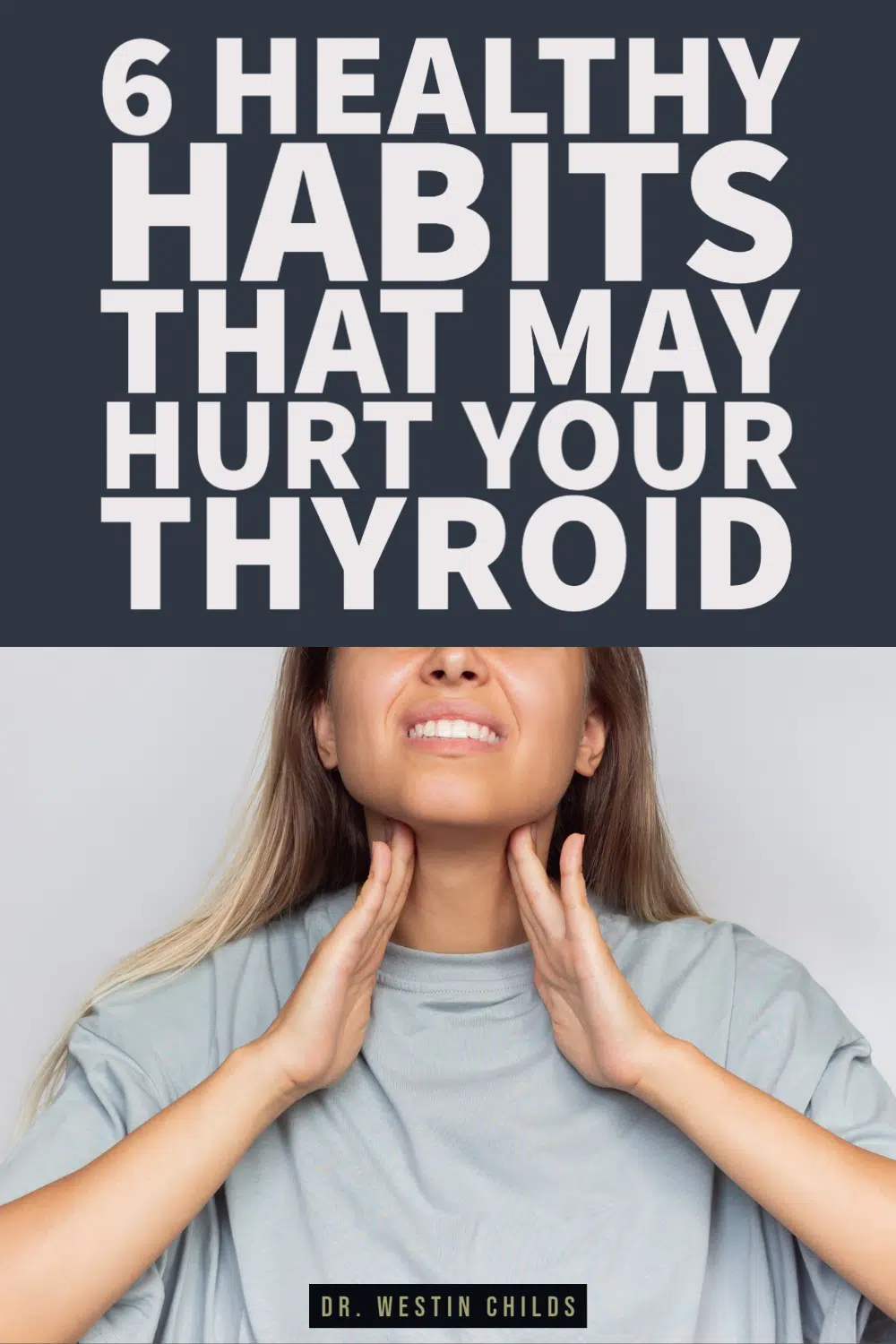
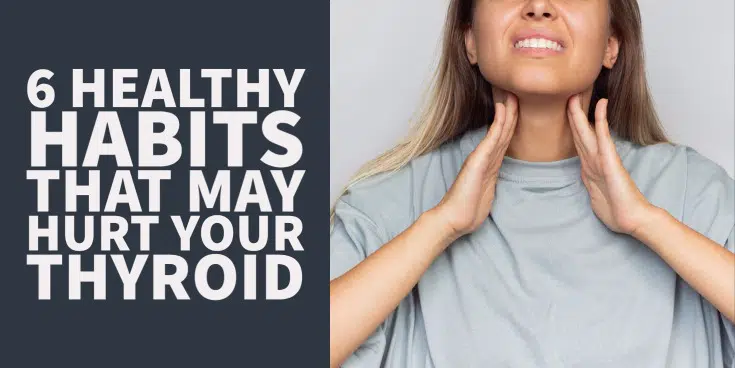

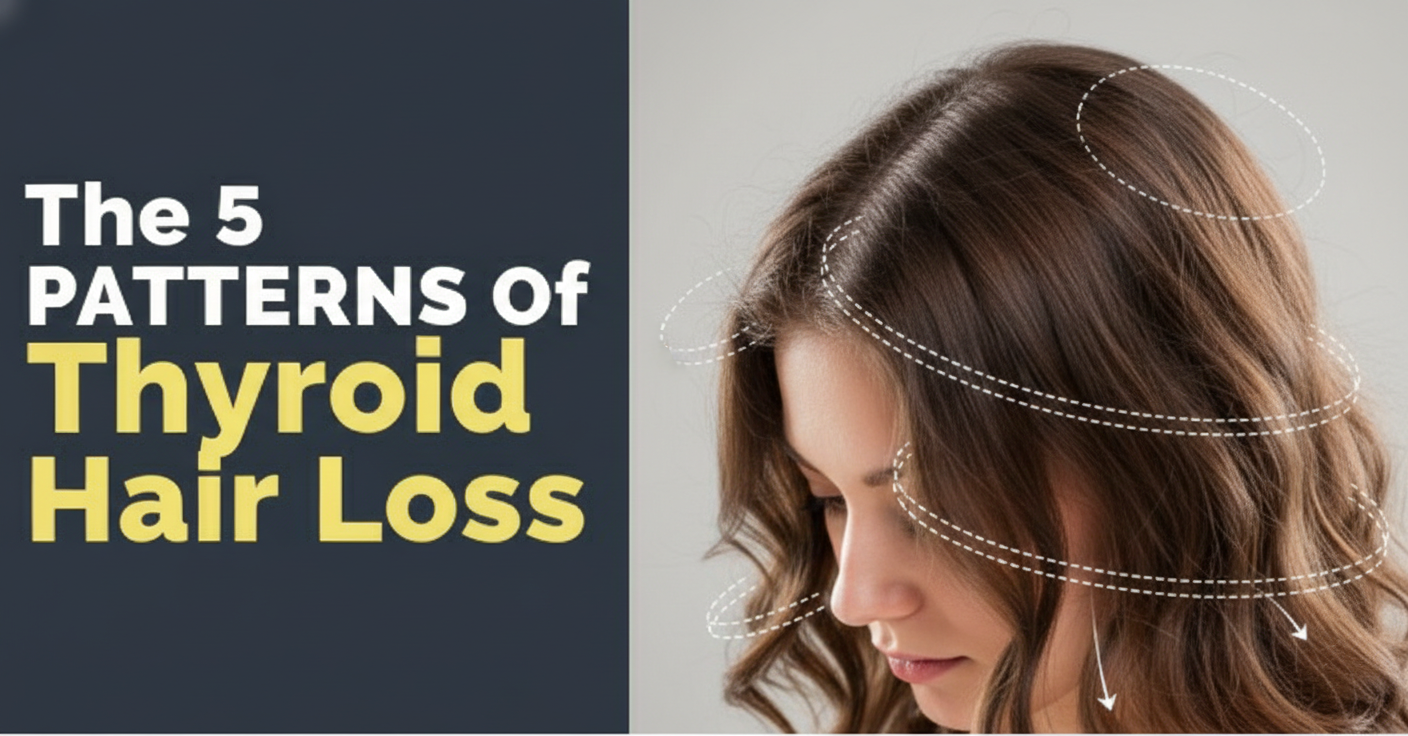
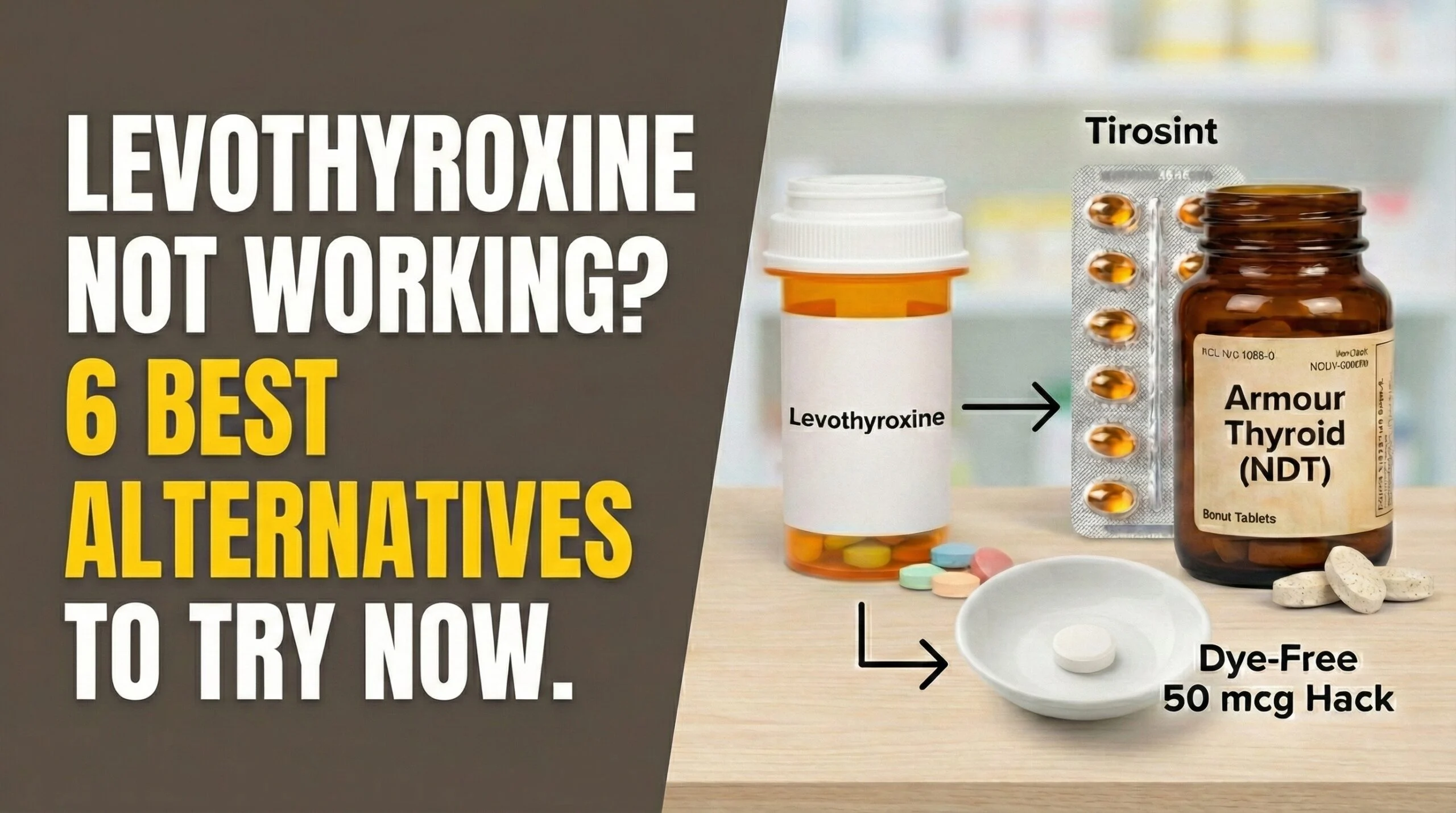
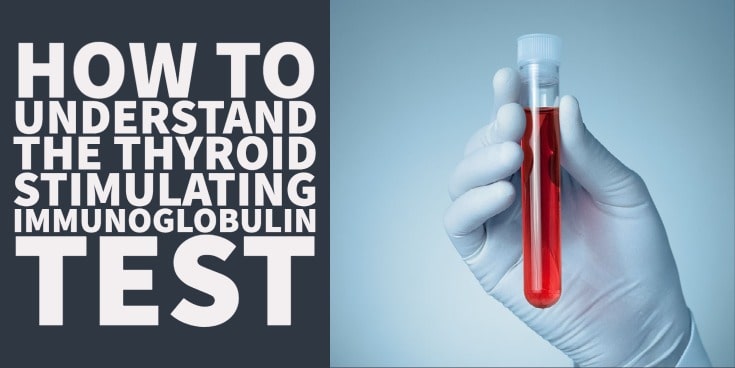
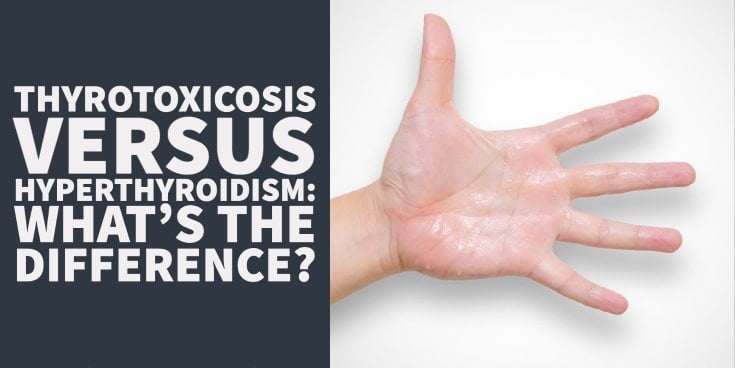
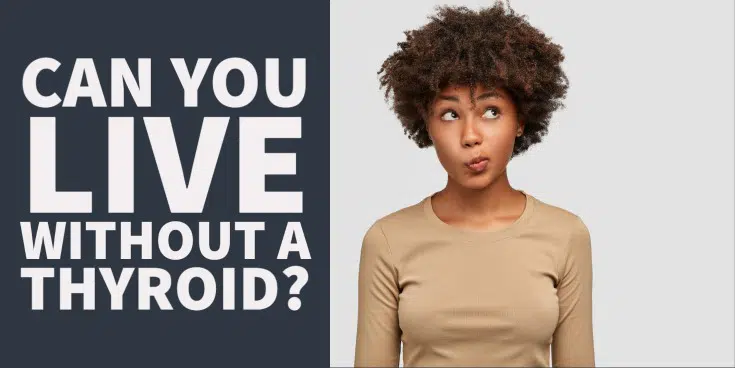
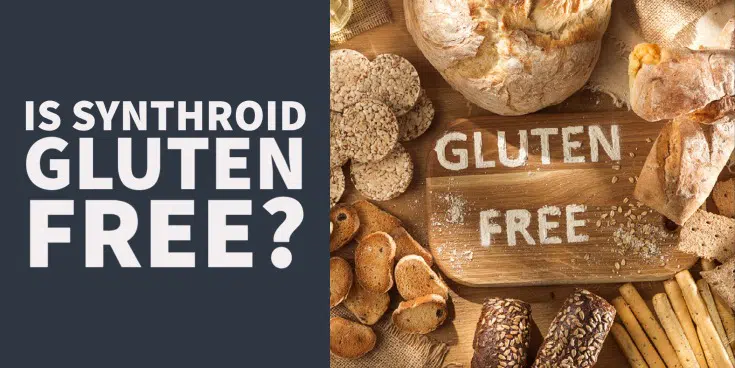

My endocronologist who examined my thryroid said not to use any additional iodine in my diet or as supplementation because he said we all get plenty enough. The ultra sound taken of my thyroid indicated a 4cm
nodule in the thyroid. Biopsy indicated no cancer. Scheduled a 6mo recheck to see if he nodule is growing. Thyroid test show no porblem with T3 or T4 levels. Don’t know if I am hyper or hypo or neither. So I am wondering what has caused the nodules [there are 3 others in the throat)and if your protocol and supplelments would reduce the size of the one in the thyroid and cause the other ones also to reduce or disappear. The info on potential foods blocking iodine uptake was helpful. Thank you.
Hi Diann,
One potential cause of thyroid nodules is iodine deficiency 🙂 Ask your doctor how you are getting your iodine on a daily basis and how he/she is so sure you are getting enough. If you want, you can also ask him/her how much iodine you should be getting each day (the answer is 150-250mcg/day). If he/she doesn’t have the answers to those basic questions then that would be cause for concern. You’d be surprised but many doctors will make recommendations about things they know nothing about, especially when it comes to supplements but they will act as if they do.
In regards to treatments for thyroid nodules, there are no guaranteed or proven treatments as the causes of nodules vary dramatically. It’s possible that supplements can help, though, and you can read more about that here: https://www.restartmed.com/thyroid-nodule-treatment/
I’m relieved to have discovered you as the only source of help so far for my Hashimotos which I’ve had for 5 years on top of Fybromyalgia and Arachnoiditis. I’m overwhelmed by how much of my daily eating habits have to change but willing to try everything you suggest as I want to feel well again. There is virtually no help from my GP for me and I’ve been waiting over a year to be seen by any endocrinologist in the NHS.
Hi Christine,
Glad you find the information helpful!
This is full of helpful information. Thank you! I had already changed my source of B12 on your advice, but I didn’t know about almonds being a source of cyanide (thankfully, I hate lima beans and sweet potatoes!).
Hi Mariam,
It’s probably minimal source but it may be worth looking into if you feel you are having lingering issues.
I’ve been taking 225 of Biotin and my TSH lab tests indicate I was on too much Synthroid. I’ve been lowered from 125 to 88 to 50 and go for a test next week. I will stop the Biotin 3-4 days before tests.
I do use pink salt and have been taking 225 iodine most days. I will be sure to keep with that.
Thanks
Hi Carol,
That sounds like a good plan!
I have heard that iodine does not last long on table salt. This article points that out; and a few other interesting tidbits.
http://iodineresearch.com/debunked.html
Hi Tacoma,
There are definitely some issues in getting your iodine from table salt, that I agree with. I think a better option is to use an iodine supplement.
My thyroid was removed completely over 15 years ago… constantly seeking insight on best ways to manage this challenge. I found your website about 5 years ago and continue to read your updates and insight. My question is, when describing the diagnosis, it is unclear where I fit in since I have no thyroid?
Hi Edwards Vickie,
Great question! If you no longer have a thyroid then you fit firmly into the hypothyroid group. All information related to low thyroid or hypothyroidism applies directly to you.
Thank you so much for the information on B12. I have been taking the wrong one!!!! I also have dry macular degeneration and it seems there is a tug of war between what I need for my eyes and my thyroid.
Jeannette
Hi Jeannette,
Happy to help! As a general rule of thumb, if you are purchasing any supplement under $20 you can almost guarantee that it doesn’t contain the right ingredients. I know this because I personally source the cost of the expensive and most bioavaiable ingredients so I know it’s pretty much impossible to put those ingredients in something under $20 just due to manufacturing costs, testing, etc.
Thank you for all your good information, i flag all your email so I will be sure not to miss anything. I have Hashimotos and don’t get enough info from my doctor and I do believe that I know more than he does. I don’t believe that I feel as good as I should. Thanks again for all your help. Drina
Hi Drina,
My pleasure! Glad you find the information helpful.
Are you planning on making any changes after reading through these habits?
I take hair and nail supplements thinking it was a good thing, but will discontinue with his information.
I also use the Himalayan pink salt because it was a small change with beneficial because of the minerals could help Fibromyalgia. But after reading this I think I should change over to Iodized salt. I don’t get a lot in my diet.
I have graves disease with sores and blisters on my legs that my cancer dr. said was related to my thyroid issues. The antibodies have eaten my thyroid and are now making my eyes budge and are constantly irritated and watery.
I am overweight and can’t seem to find anything to really help me. I am taking your suggested weight loss pill in hopes it will help me get this weight off!
I read all of your articles but I wish you were a practicing doctor to help me with my problems.
Thank you,
Hi Janet,
Just a couple points of clarification:
You can still take a hair, skin, and nails supplement (and it may still be beneficial) you just want to be aware that it may impact your thyroid lab tests. To avoid this problem all you need to do is avoid taking it 2 days prior to when you get your labs drawn.
Likewise, you can still use himalayan pink salt, you just need to be aware that it does not contain iodine. In addition, it’s often better to just use iodine supplements because you can more carefully titrate your dose of iodine. This is in contrast to iodized salt in which can be difficult to assess how much you are getting each day.
Hope this clarifies!
Thank you very much for all this information, very useful. Tjsnks Dr Child for all your divulgation. I am supplementing myself with 3 drops of nascent iodine in the mornings and 100 micrograms of iodine with 150 seleniometionine and L-tirosine at night before going to sleep and I see my health has improved a lot: reduced brain fog (almost dissapeared) and fatigue.
Hi Teresa,
Glad to hear you found a combo that works for you!
How does all of this advice impact patients that have had their thyroid removed? I am confused: about the amount of iodine since we do use pink Himalayan salt exclusively; we also eat a lot of green vegetables, cooked or sauteed, and eat a basic keto diet. I don’t take extra selenium although I did buy it as a supplement, but after reading more about it, figured I may be able to or should do without it, as the symptoms you noted above for selenium toxicity are all ones that I have, although I realize those are also symptoms for many other deficiencies. I take methylcobalamine daily, as it seems to help my fatigue. As well as nutritional yeast.
Hi Patti,
The information still applies with few exceptions. For instance, when the thyroid has been removed your need for iodine remains but is significantly decreased. The majority of the iodine used by the body is stored and used by the thyroid gland so once that is removed you can get by with less iodine/day compared to someone with a functioning thyroid gland.
Selenium still helps promote T4 to T3 conversion which is important for those without a thyroid since most are taking only T4. But it’s certainly possible you were taking too much as well. I have other articles which outline how to take selenium: https://www.restartmed.com/selenium-thyroid/
Is sublingual the best b-12 to take? I’ve been taking sublingual b-12, but now see that it is cyanocobalamin! I’ve tried other types of sublingual b-12, (non-cyanocobalamin) but is won’t dissolve and 1/2 an hour later is still whole under my tongue! If my multi-vitamin has 300% b-12, is that enough, even though it is not sublingual?
Hi Carole,
Not necessarily. If we are talking “best” then I would personally say that B12 shots are best. My personal experience suggests there isn’t much of a difference between sublingual b12 and b12 capsules but there is a big difference between both of those and B12 shots (in favor of the shots).
When it comes to B12, you really don’t need to worry about the RDA since it is water soluble and there’s virtually no risk of taking too much. Larger doses tend to be better for thyroid patients. You can see the type of doses that I recommend here: https://www.restartmed.com/product/power-b-complex/
I am reading all of your insights, and I do find them helpful. So far, I’m about a year into no thyroid. After being stuck into a rut of perpetual fatigue (I don’t think that simple word clearly describes what it’s like to feel tired from the inside out!). Anyway, I have been taking 2 of your T3 conversions and 4 of the daily vitamins for about 3 weeks. I do feel a bit better since taking them.
I haven’t had my T3 taken since before the surgery. I plan on requesting that when I return to Endo dr. in the fall. I have a sneaking suspicion that is/was part of my problem. (other labs are all “normal”_
As for this particular article, the one big thing I will take away is consume enough iodine! Also, thanks for clarifying in an earlier note that I fit into the hypothyroid.
Thanks for all the extra insight emails!
Hi Linda,
Happy to help and glad you found the information helpful! It’s worth pointing out that your iodine demand is less than the average person because you no longer have a thyroid so you don’t have to worry too much about iodine in your specific situation.
Hi
I’m taking 10 mg over the counter pregnenolone and am on 20 mg Cytomel for borderline hypothyroidism. Can I take both of these together? Or should I take pregnenolone in the am on empty stomach? I take Cytomel at 6 am. Thanks
Hi Char,
You never really want to take any other supplement, hormone, or medication at the same time as your thyroid medication. They can be used together but they should not be used at the same time. You can learn more here: https://www.restartmed.com/how-and-when-to-take-thyroid-supplements-for-maximum-benefit/
Is there a somewhat reliable test for Iodine? Seems it’s equally bad for it to be too low as too high, which makes me very leery of supplementing.
Bummer, now I have to ease way up on Cassava which has replaced my gluten/grains. Been relying on it way too much it sounds like.
Hi Dorthe,
Unfortunately, there is not. You can read more about the various iodine testing methods available and how they all fall short here: https://www.restartmed.com/iodine-testing/
I thought if you take T4 only then you are getting enough iodine because as the T4 drops an iodine molecule in the conversion to T3 then there is iodine circulating in the blood. Is this correct or do treated hypothyroid patients still need to supplement with iodine?
Thanks Sue
Hi Sue,
Those being treated with thyroid medication still need iodine, they just need less than the average person based on the level of the TSH.
Hi Dr.,
I was told by Dr. that biotin affects your medication when you are hyperthyroid so do not take it is that correct? Biotin is good for hair and skin so I would have to remove it altogether? I drink two pea protein shakes a day for breakfast and lunch with an added elixir both with biotin is that still bad? I don’t take b-complex only vegan b-12. Thank you.
Hi Natalie,
That is not correct. You can completely avoid the impact that biotin has on your thyroid lab tests by not taking it 2 days prior to when you get your labs drawn. It makes no sense to completely avoid biotin given that it’s very easy to solve the biotin-thyroid lab test problem: https://www.restartmed.com/biotin-and-thyroid/